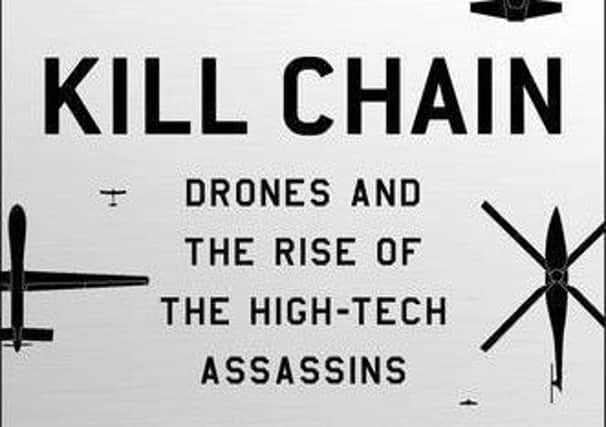Book review: Kill Chain by Andrew Cockburn


Kill Chain: Drones And The Rise Of The High-Tech Assassins
Andrew Cockburn
Verso Books, 368pp, £20
Less than two weeks after 9/11, George W Bush signed off on a list of two dozen people the CIA was authorised to kill or capture without further review. “I want justice, and there’s an old poster out West as I recall, saying, ‘Wanted, Dead or Alive’,” he said. His successor Barack Obama embraced and expanded a program of “targeted killings” of High Value Individuals or HVIs. The former law professor personally approved the de facto executions at weekly meetings. “Turns out I’m really good at killing people,” he was quoted as saying.
‘Drones, baby, drones’ is the title of a chapter in Kill Chain, in which journalist and author Andrew Cockburn turns his well-reasoned and sometimes dense critique of drone warfare into finely honed outrage. The intense campaign in North West Pakistan, at its peak with one missile strike every three days in an area the size of Maryland, cast a pall of fear over weddings and funerals. It included the killing of 45 men, sitting in two circles 20 feet apart, at a jirga, or community meeting, to discuss a dispute over mineral rights in an area controlled by the Taliban. They were incinerated with Hellfire missiles.
Advertisement
Hide AdThe chapter moves to the escalating attacks in Yemen, where the government was happy to use the US to kill people too troublesome to arrest. Nine strikes over a period of 15 days in 2013 killed 49 people. The dead included Hamid al-Radmi, who while an Al Qaeda member was also a key local negotiator with government officials.
Cockburn’s book never loses its sense of balance but provides the ammunition for believing that everything you ever feared or suspected about drone warfare is true. Missile strikes from Afghanistan to Yemen, directed from remote control video screens on the other side of the world, are not only legally and morally questionable, but riven with the risk of mistaken identity. People aren’t people, but “Military Age Males” or MAMs. An ever-lengthening list of killings is repeatedly likened by professionals to “mowing the lawn”, handing power to a younger, more radical set of leaders.
Cockburn draws a line from the Second World War through Vietnam, Israel, and South America, and the self-deluding insistence that the latest technology combined with remote surveillance and bombing from the air can fashion justice, democracy and military victory. But eliminate drug kingpins in Colombia, the argument goes, and you face even more ruthless and violent Mexican cartels. In Iraq, when teams killed off an insurgent leader, Improvised Explosive Device attacks would increase, carried out by young men “smarter, younger, more aggressive, and out for revenge.”
Sometimes it’s a dense argument, too broad in its range, but then it’s hard work trying to counter the sexy show of ticking names off a wanted list. We need to be reminded that the real world isn’t Hollywood, that despite drones now running to $250 million a piece or systems like Gorgon Stare, said to monitor an entire town down to objects as small as six inches across, remote targeters still struggle to distinguish helmets from turbans, seasoned killers from praying tribesmen who carry guns as a matter of course.
Cockburn notes the expansion, in Iraq, of killings from “household name” terrorists to first mid-level commanders, and then, using “social network analysis” to individuals who were shown, by their telephone or email contacts, to be “vital nodes”. “So heaven help a pizza-delivery store owner getting a lot of calls from a terrorist cell,” he writes. It’s a story laden with dark irony, and at a time when the bombing, of all sides, by all sides, is causing the desolation of Syria, one that vitally needs to be revisited.
• Andrew Cockburn is at the Edinburgh Book Festival on 17 August